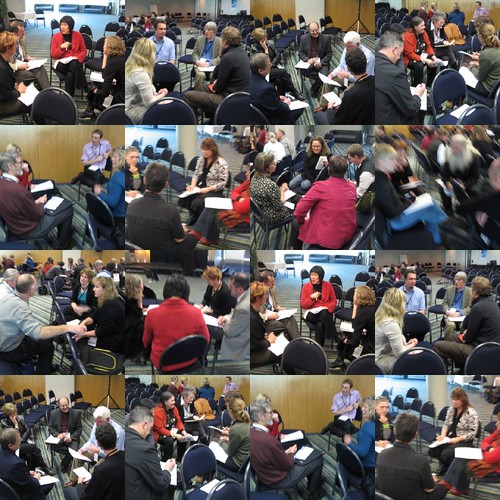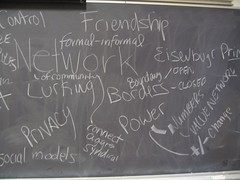 Passing this along from Leigh Blackall…This is a terrific set of “mini-events” around a variety of online community and collaboration topics. NOT TO BE MISSED!
Passing this along from Leigh Blackall…This is a terrific set of “mini-events” around a variety of online community and collaboration topics. NOT TO BE MISSED!
Participants in the Facilitating Online Communties course have come together to coordinate an online mini conference. Below are the range of events scheduled so far. Keep an eye on the conference wiki for up to the minute details. See you there!
A mini conference for Facilitating Online
From Facilitating online communities
Date: 2 – 9 November 2008
All times are in Coordinated Universal Time (UTC) unless stated otherwise. Use this time convertor to work out your times.
2-9Nov Community Leadership Development
Title: Community Leadership Development – review and feedback
Date: online discussion
Duration: throughout the conference period
Facilitators: Valerie Taylor with guests and friends
Venue: blog posts, discussion page threads
Description: Community Leadership Development – online, open education and skills development for individuals and groups working with community-based organizations to provide leadership training, needs assessment and planning, coordination and management of projects to benefit the community.
As Community Leadership Development is a new course modeled on FOC08 and CCK08, participants in the FOC08 Mini Conferences are uniquely qualified to provide input, feedback and suggestions.
Throughout the Mini Conference, questions about the content and the process for the course will be posted for review and comment. Summaries and links to contributions will be posted each day.
Questions, offers of collaboration welcome.
2-9Nov Managing Multimembership in Social Networks
Title: SCoPE seminar discussion: Managing Multimembership in Social Networks: Oct 27-Nov 9, 2008
Facilitators: Bronwyn Stuckey, Jeffrey Keefer, Sue Wolff, Sylvia Currie
Description: How do you track and keep up with blog conversations? How do you manage your time as you engage in social networks? What are our limits as we integrate social learning into our work environments? When you do find yourself becoming disconnected from your networks and organized activities, how do you return to the fray? As facilitators how do you manage multimembership for your participants?
Many of us confess to fumbling along and we engage in multiple networks. Yet, many networks are essential for the projects, sectors and people that we work with, and for staying abreast of hot issues. Multi-membership and multi-platform overload is becoming a BIG challenge!
During this 2-week discussion we invite you to share tips for managing participation in social networks. This seminar is organized as part of the Facilitating Online Communities course mini-conference. There are many ways to participate! Take our survey, leave a Voice Thread, and join the asynchronous discussion.
Venue: SCoPE is an open, online community supported by BCcampus and hosted by Simon Fraser University. Membership is free and open to the public and our discussions are facilitated by volunteers. Access the seminar discussion directly.
Planning for the event: A record of our planning steps is on a subsequent wiki page: /multimembership
5Nov-7pm The Role of an Online Facilitator
Date: 7pm on Wednesday 5th November UTC (8am on Thursday 6th NovemberNZ DST) Check the time in your zone.
Duration: approximately 1 hour
Facilitator: Vida Thompson
Venue: Skype (contact skype user: vidathompson in advance to join this session)
Description I recorded an interview with a Community Facilitator here in Alexandra, Central Otago, New Zealand. For the mini conference I would like participants to listen to the inteview and then discuss their perception of the role of an online facilitator and how that compares to the role of a face to-face community facilitator. This discussion will be held on skype on Wednesday 5th November at 7pm UTC. (Contact skype user: vidathompson in advance to join this session).
All interested people are welcome to attend. It would be good if participants could listen to the interview before the event. Note: The interview does take a while to start as I edited the beginning out.
Please contact Vida Thompson in skype prior to the event so you can be included in the event when it starts (contact skype user: vidathompson or by e-mail address:vidat@tekotago.ac.nz) There is a limit of 9 participants who can talk but no limit to the chat contributions.
5Nov 9pm Interview About Second Life in Second Life
Title: About Second Life
Date: Wednesday 05 Nov UTC at 9.00pm (Thursday 06 Nov 10.00 am New Zealand Time)
Duration: 30 Minutes
Facilitator: Grant Comber (aka Avatar: Clinty Inglewood)
Venue: Explorer Island in Second Life
How to get there? Click on this SLurl Link and then click on the Teleport Now button to zoom to Explorer Island. The Second Life Grid coordinates for the Venue are 195,208,22 (PG) Your Host Clinty Inglewood will meet you.
Reminder: Min computer specs – RAM: 500mb (preferably 1 Gig) Chip speed: 800 MHz Pentium III or better, Screen 1024×768 pixels Internet Connection: Cable/DSL Microphone/headset needed for Chatting
Description:An interview between newbie Grant Comber (Clinty Inglewood) and seasoned Second Life user Harold Atkinson (Hat Carter). General questions on the use of Second Life and sharing of unique experiences. Opportunity for all avatars in FOC to gain some insight into using Second Life especially those who are newbies like Grant!
So if you want to philosophize, go didactic on us or just talk some technical turkey issues please pop in for this casual interview.
My thanks to our guest Harold Atkinson who is a fellow teaching colleague of mine with much Second Life experience. See you there! Signing Off: Clinty Inglewood
6Nov-8am Stigmergic Collaboration: The Evolution of Group Work
Facilitated by: Daryl Cook with guest Dr. Mark Elliott.
Mark completed a PhD in 2007 that developed theoretical frameworks for collective activity and mass collaboration in conjunction with a number of real-world projects and now runs a consultancy that provides services surrounding online collaboration and social media / web2.0. In our meeting, Mark will assist us to explore:
- Stigmergic collaboration as a means of explaining how co-ordination is achieved in ad hoc, massively scaled collaborative contexts (i.e. Wikis)
- How we can, as facilitators, use Wikis to collaborate, share and learn
- His experiences from the Future Melbourne project — the world’s first, wiki-based, collaborative city plan.
The one hour session, will include a very brief presentation, but will mostly be informal and conversational. Definitely no Powerpoint.
Please join us!
DATE: Thursday 6th November 2008 at 7PM EST or check the time in your time zone.
VENUE: Join this online event at the Elluminate Meeting Room
Beforehand, please ensure that you computer is ready to use the web conferencing software (Elluminate).
RSVP: daryl.cook@gmail.com
ENQUIRIES: For any enquiries and/or for any assistance with Elluminate, do not hesitate to contact me.
6 Nov-10pm International Online Collaboration Group meets FOC08
Title International Online Collaboration Group
- Date and Duration – UTC Thursday 6 November 10pm-11pm UTC (Friday 7 November 9am – 10am East Australia time)
- Facilitators: Kerry Trabinger (CIT Australia) and Leigh
- Description
This is a FANTASTIC opportunity for the group to meet with teachers who are currently completing a subject called Facilitating Learning Online in Australia. Come and discuss your experiences. Topics will include: – Introductions (where are you from and what area are you teaching in) – Virtual Classrooms – Do you like this platform? Will you use it with your students? Why or Why not? Any tips on using these platforms. – Time Management – How does your Institute allocate time for online delivery? Is it the same as for face to face? – Marketing – how can you get students or participants to join in an online dicussion or virtual classroom session? PLUS you have a chance to try a different virtual classroom platform.
- Venue – VET VIRTUAL (a virtual classroom used in Australia VET Sector – www.vetvirtual.com)
6Nov-1030pm TLC (Think, Learn & Create) Using Mind Maps
Title: TLC Using Mind Maps (TLC – Think, Learn & Create) – Online Discussion, followed by Presentation, – Friday 7 Nov 2008 11.30 am – 12noon NZ DST (10.30 pm – 11 pm Thursday 6 Nov UTC)
Facilitators: Kay Lewis and Elaine Dittert
Description:
- Have you had difficulty keeping up with the ‘overload of information’ during this course?
- Got confused or lost by trying to view all the discussion threads?
- Have you jotted down some thoughts and ideas you’ve read and heard but by the time you’re ready to go over your notes they make no sense?
If this sounds like you, this 30 minute session may be just what you need. It is designed to give you some pointers to help you gather and organise large amounts of data and provide a clear overview, analyse your thoughts, identify problem solving ideas and generate more ideas with clarity, efficiency and accuracy.
We plan to have one special guest speaker:
- Jennifer Goddard, BBus (Admin), Master of Entrepreneurship and Innovation, Master Trainer in Buzan Advanced Learning Techniques, inspirational Director of the Buzan Centre in Australia and New Zealand and co-founder of Mindwerx International. OR
- Jennie Vickers, Buzan Licensed Instructor (senior advanced coach), Masters of Management, Diploma in Business Administration (University of Auckland), BA Law (Honours). Jennie is also an Alumni of the Leadership NZ Programme.
Venue: From your feedback in the discussion here [1], we will use 24/7 Meeting Room (Elluminate) or Skype to host the presentation.
7Nov-4PM EST Storytelling
Title: Storytelling
Date: November 7, 2008 at 4PM EST or check the time in your time zone.
Duration: 60 minutes ?
Facilitators:
Venue:
- Join the event on WiZiQ
- Join the event on Connecting Online.
Description:
- Do you think of stories when you look at a photo, a video, or listen to music? Does the topic interest you as a tool for instruction and learning or are you just curious? In any case, for whatever reason you may have, you are invited to join this storytelling mini conference.
- We will have a live storytelling event on WiZiQ or Elluminate. Please refer to the main page of Connecting Online for further discussions on the topic.
Further Information
8Nov-Midnight Heart2Heart Online
Title: Heart2Heart Online
Date: Tentatively Saturday, November 8, 2008 00:00 UTC Time
Duration: 90 minutes
Venue: TBA (Skype, Elluminate Meeting Room or WiZiQ)
Group Size: Maximum of 8 people
Facilitator: Greg Barcelon assisted by partner Ivy (guest)
A place where we can simply be ourselves… sharing ourselves at a deeper level without the fear of condemnation, unsolicited advice, interruption or being judged.
Traditionally we got this deep level of connectedness with our true selves, and assist others in doing the same, from our families. But, with many people experiencing difficulties in their family life today, we need communities that can become “Schola Amoris,” a School of Love, in which all learn to first of all accept themselves as they are, and then in a greater way accept others unconditionally – the greatest yearning we collectively have.
More about it here.
TBA Connecting Online in Developing Countries
Connecting Online in Developing Countries
Title: Connecting Online in Developing Countries
Date: Saturday November 8, 2008 at: See your time zone, please.
Duration: 60 min?
Faciliatator: Joy Zhao & guest speakers
Venue: WiZi or 24/7 Meeting Room
Description: to be updated…
—
Posted By Leigh Blackall to Facilitating Online Communities at 11/05/2008 10:08:00 AM



